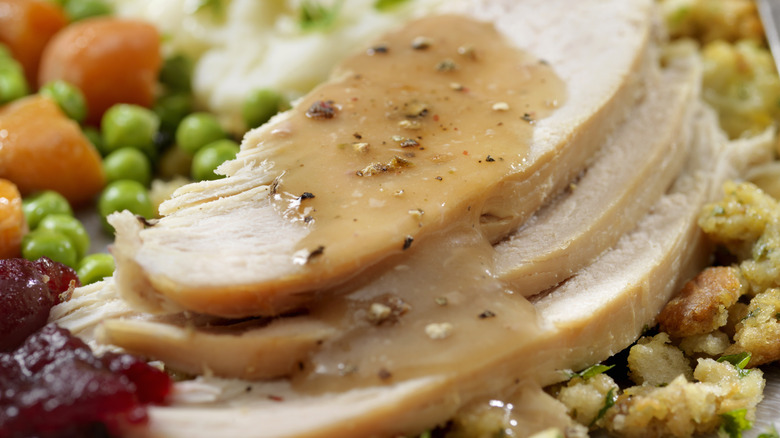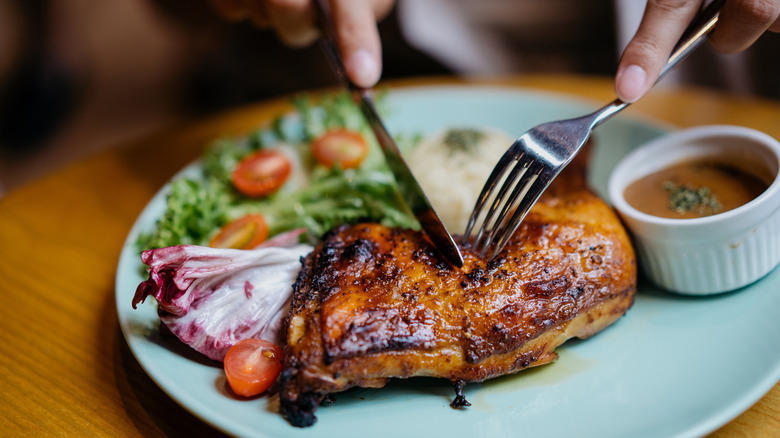The Popular Protein That Can Help Reduce Anxiety
Of the many things that impact our mental health, food is one of them. While research has shown that consumption of inflammation-promoting foods such as soda, red meat, and refined grains can increase one's risk for depression, foods such as fish, beans, and leafy green vegetables have oppositely shown to protect against the mental health condition (via Missouri Medicine).
When it comes to anxiety, specifically, the Anxiety and Depression Association of America reports that over 19% of adults in the U.S. are living with an anxiety disorder. Those with anxiety may experience excessive worry, ruminating thoughts, dizziness, sweating, or an increase in heart rate. Similar to studies that examined the relationship between diet and depression, research has shown that artificial sweeteners, processed foods, refined carbs, and fried foods are a few of the different food items that can heighten anxiety symptoms, according to a 2021 scientific review published in Nutrients. On the other hand, diets that center around the consumption of omega-3s, nuts, seeds, vegetables, and fruit — like the Mediterranean diet, for example — have been linked with decreases in anxiety.
Evidence suggests that consumption of tryptophan, a natural amino acid found in protein, may also lessen anxiety symptoms. Packed with tryptophan, this popular poultry can be found in your club sandwich or on your Thanksgiving table. Yes, you guessed it: It turns out that turkey may help support our mental health.
The tryptophan in turkey helps our body produce serotonin
In a 100-gram serving of cooked turkey breast meat (approximately 3.5 ounces), you'll find 287 milligrams of tryptophan, according to the U.S. Department of Agriculture (USDA). The connection between tryptophan and anxiety relief is the fact that the amino acid aids in the making of serotonin (via Nutrients). According to Cleveland Clinic experts, serotonin — or the "feel good" hormone — is a neurotransmitter involved in happiness, mood, memory, and more. Having low levels of serotonin in the body is thought to contribute to anxiety and depression. For this reason, some patients may be prescribed selective serotonin reuptake inhibitors or other kinds of antidepressants that work to boost serotonin.
In a 2016 study published in the Archives of Psychiatric Nursing, researchers found that young adults who ate tryptophan-rich foods over the course of four days had lower anxiety scores than those who ate a low-tryptophan diet for the duration of the study. A high-tryptophan diet was defined as consumption of more than 10 milligrams of tryptophan per kilogram of body weight daily, while consumption of less than 5 milligrams per kilogram of body weight per day was considered a low-tryptophan diet.
Don't like turkey? Roasted chicken may also help lower anxiety
As far as poultry goes, turkey isn't everyone's jam. The good news is that you can get essentially the same amount of tryptophan in roasted chicken as you can in turkey. In fact, you'll actually walk away with a little bit more. A 100-gram serving of turkey has 287 milligrams of tryptophan, but the same-size serving of roasted chicken meat has 292 milligrams (via USDA). While tryptophan may be more widely associated with turkey, chicken can serve as a pretty tasty, anxiety-reducing backup.
Choosing more nutritious foods on a daily basis may support our mental health, but it shouldn't replace professional treatment if you feel anxiety is impacting your quality of life. Cleveland Clinic experts explain that a physician or mental health specialist may recommend counseling and/or certain medications such as anti-anxiety drugs, antidepressants, or beta-blockers.
If you or someone you know needs help with mental health, please contact the Crisis Text Line by texting HOME to 741741, call the National Alliance on Mental Illness helpline at 1-800-950-NAMI (6264), or visit the National Institute of Mental Health website.



